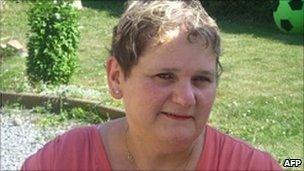What could drive a mother to infanticide?
- Published
With the grim discovery this week by French police of eight newborn babies allegedly smothered to death by their mother, the BBC's Zoe Murphy asks what could lead a woman to kill her child in the first few minutes of life.

Dominique Cottrez is relieved that her 20-year secret is finally out, her lawyer says
Police unearthed the remains of the eight tiny bodies at two properties in the village of Villers-au-Tertre, in northern France.
Dominique Cottrez, a 45-year-old care assistant, is said to have kept her dark secret from her husband for more than 20 years.
Mrs Cottrez will now undergo a series of psychological tests.
Prosecutors have said she was "perfectly aware" of her actions.
But the results could show she was suffering from a little-known condition called pregnancy denial.
Pregnancy denial is usually associated with neonaticide - the killing of children within the first 24 hours of life.
According to Professor Laura Miller, a leading expert on women's mental health at Harvard University, the condition has different levels of severity.
The mildest form is an emotional denial where the woman is aware she is pregnant but has no "emotional response" - she makes no preparations nor shows any outward acknowledgement that she is having a baby.
The middle ground is a suppression or denial of the pregnancy, even when it is obvious to others - attributing weight gain to other causes and the temporary halt of menstruation to stress or other factors.
In the most severe cases - psychotic denial - the woman is delusional. For example, she will still not recognise the pregnancy even when faced with indisputable proof such as an ultrasound scan.
Prof Miller, who co-wrote Infanticide: When Mothers Kill, said there are several triggers: substance abuse, the loss of a child, and the most common risk factor, "that there would be horrible, horrible consequences, such as being kicked out of the family".
In cases of psychotic denial the woman "never forms the feeling that the baby is a separate person", she explains.
A woman may only be minimally aware of what she is doing. For some the killing is a "passive act", for example giving birth in a toilet and letting the baby drown, says Prof Miller.
'Perfectly aware'
According to French prosecutors, Mrs Cottrez, who has two adult daughters aged 21 and 22, said she decided "she did not want any more children".
They quote her as saying that after a difficult first birth because of her weight, she did not want to see any more doctors.
She was "perfectly aware" of her condition and was alone in her pregnancies and while giving birth, prosecutor Eric Vaillant told reporters.
But a lawyer for Mrs Cottrez has warned that this assumption may be "a bit hasty".
Child and adolescent forensic psychiatrist Sue Bailey says the Cottrez case is unusual as pregnancy denial is most common among young girls who are not in a relationship and who fear disapproving adults.
She says the alleged killings throw up many questions, including why were the first two children allowed to survive.
A change in circumstances during the period 1989 to 2006 - when the deaths allegedly took place - such as the loss of an important family member like her mother could be significant, says Prof Bailey of the University of Central Lancashire.
Dominique Cottrez has been described as a "doting grandmother" by her daughters, who each have a son.
Prof Bailey says a change of life position from mother to grandmother could have a bearing on a woman's state of mind.
Questions will be asked about the nature of Mrs Cottrez's relationship with her husband, and the circumstances surrounding her pregnancies, she says.
Mr Cottrez has been cleared of any wrongdoing. Police say he was "dumbstruck" by the revelations.
'Killing myself'
This is the latest high-profile case of multiple infanticide in France in recent years.
Veronique Courjault, 42, was found guilty in 2009 of killing three of her newborns - two of whom she hid in a freezer, and were later discovered by her husband.
During her trial, Courjault said that she and her husband had agreed not to have any more children and that in her subsequent pregnancies she had felt no connection to the foetus growing inside her.
"I could not feel them move inside me," she told psychiatrists. "As far as I was concerned they were never children. It was a part of myself, an extension of myself that I was killing."
In Courjault's case and those before her where pregnancy denial has been cited, French jurors seem to have handed down more lenient sentences.
Courjault was released in May this year, after having served half of her eight-year sentence, including detention while awaiting trial.
There is "tremendous variability" in the legal weight given to the condition, says Prof Miller
"There is really no consensus across judiciaries. Medically it is not as widely recognised as it should be."
She says the number of such cases is "an unknown" - a sort of denial of the denial.
- Published29 July 2010
- Published29 July 2010